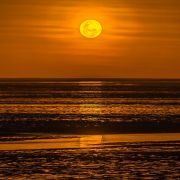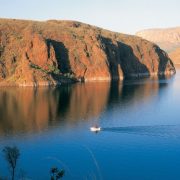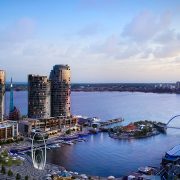Red Dog Red Earth
Australia’s favourite dog isn’t the only star in the new movie Red Dog: True Blue – Western Australia’s amazing Pilbara also takes centre stage.
Located in Australia’s North West, the Pilbara has some of the world’s most ancient landscapes, dating back two billion years and stretching more than 400,000 square kilometres.
The red dirt landscapes features deep rocky canyons, hundreds of islands with dazzling white beaches and untouched coral gardens, incredible Aboriginal art and culture and a big mining industry.
Red Dog: True Blue tells the story of family, friendship and adventure between a young boy and a scrappy one-of-a-kind dog that would grow up to become an Australian legend.
It is the prequel to one of Australia’s most successful films, Red Dog (2011), recounting the story of Red Dog’s origins.
Here are 10 ways to experience the Pilbara like the original wanderer.
Snap a selfie at the Red Dog statue in Dampier
Be sure to stop and snap a selfie at this popular tourist spot, located at the entrance to the town of Dampier. Featured in the books and movie, this statue was erected in Red Dog’s memory “by his many friends made during his travel.”
Discover Red Dog’s top spots in Dampier
Dampier is the largest tonnage shipping port in Australia and houses massive export facilities. With a Red Dog signposted in the works, take a short tour around town to get a feel for the place where Red Dog spent much of his lifetime.
Explore the gateway to the Pilbara, Karratha
Located 20km east of Dampier, Karratha is the fastest growing town in the Pilbara. Here, visitors can walk heritage trails, visit ancient Aboriginal sites and take a dip at a number of refreshing beaches. It’s also a great starting point for visits to the historic towns of Cossack and Roebourne, and the beach lovers’ paradise of Point Samson.
Visit the working harbour of Port Hedland
This Pilbara town was visited by Red Dog on many occasions. While here, you can take a local history and town tour, see the natural phenomenon that is Staircase to the Moon, witness a multitude of native wildflowers in the winter months, and see artworks from talented local Aboriginal artists.
Stay on a working cattle station
Step into the station life at one of the region’s working cattle stations, including Cheela Plains and Pardoo Station. It’s a great chance for visitors to stay and explore the Pilbara’s wild side.
Explore epic landscapes, gorges and natural swimming pools
Two hours south of Karratha lies Millstream Chichester National Park, home to rolling hills, spectacular escarpments, tree-lined watercourses and hidden rock pools. Further inland, Karijini National Park, often referred to as the ‘jewel of the Pilbara’, is home to deep gorges and emerald coloured rock pools. Get adventurous with walking trails and guided tours that take you paddling, abseiling and swimming through the park.
Quench your thirst at a historic hotel
Located between Roebourne and Port Hedland is the Whim Creek Hotel, a popular stop for hungry and thirsty travellers. Established in 1872, the hotel is the only remaining building from the settlement which was built around a copper mine.
Take a mining tour
The Pilbara is also known as the engine room of Australia – home to a massive mining industry in crude oil, salt, natural gas and iron ore. There are plenty of opportunities to witness the mining in action, including a Point-to-Point Tour which can be booked at Roebourne Visitor Centre and Port Hedland’s Port Interpretative Walk.
See if you can count the iron ore trucks on the Pilbara Rail train. Red Dog was famous for travelling by whatever means he could, including on the iron ore trains. The Pilbara rail network is the largest privately owned and operated rail network in Australia, so it’s pretty common to come across 3km long trains on your own Pilbara adventure.
See Salt or Sea Salt
The Pilbara produces a whopping 10 million tonnes of salt each year! The salt industry has been a part of the fabric of the region for many years. Port Hedland’s Redbank Bridge Lookout offers great views of towering piles of salt. Further south, salt evaporation ponds covering almost 90 square kilometres can be seen while driving into Onslow.
Details







